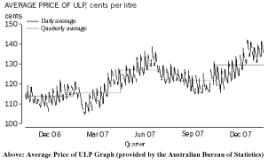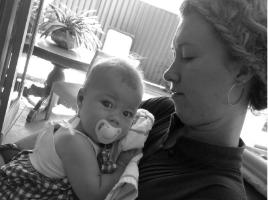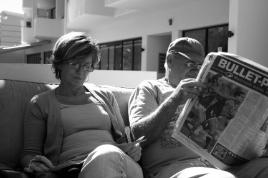Petrol: the real cost
Published on 20 August, 2008
Customer: "Pump number 2 thanks..."
Service Station Operator: "That'll cost you 6 hours away from your family and 2 hours of quality time with your wife."
By student reporter Sarah Herron

Above: Average Price of ULP Graph (provided by the Australian Bureau of Statistics)
And so it is, as filling up the car became, no longer an unfortunate speed bump in life, but more of an epic mountain range to navigate the future around. The price can no longer be explained solely in dollars and cents. The real cost, which is becoming ever more apparent, is time.
Time with our children, time with our husbands, time with our wives. Time with our loved ones, time we once spent well, now spent for the petrol pumps.
How so?
We all know and can clearly see the ever rising dollar price of petroleum. The Australian Bureau of Statistics (ABS) reported that from December 2006 to December 2007 the price of automotive fuel rose by 14.3%.
From December 2007 to March 2008 the ABS reported a rise of 5.4%, and for March to June 2008 a rise of 8.7%.
How do these figures add up for you? Do these figures, 14.3%, 5.4% and 8.7%, tell the tale of woe sufficiently enough? Do they express the true financial cost?

'Where is my Dad?' is the question future generations will be asking.
Put simply, no. A translation of those figures could more truly be expressed by looking, not at the Consumer Price Index, but at the evident effects on local people and their changing life styles.
So what is the real cost?
Jamie, a satellite technician for Austar, uses his vehicle for work on a daily basis. His wife Lucrezia also has a small car that she uses to do the school run for their two boys and to travel to work and back twice a week.
For Lucrezia, filling up the tank can only happen on pay day and whereas before she never needed to pay it much attention, now she notices that half per pay ends up in the petrol tank.

'I think we can afford to get married now dear' is the statement future generations will be saying more of.
Jamie travels up and down the coast for his job and usually fills the tank twice a week. The financial cost per tank is now $154. It cost $80 only a year and a half ago. To pay for this, Jamie's work habits have had to change, working extra hours during the week and even Saturdays. By the way, Jamie's work vehicle uses diesel.
Whereas before, Jamie would come home two or three times a week before 3pm, it is now a rare occurrence for the boys to see their dad before dinner time. Whereas before, Jamie and Lucrezia would pick up the two boys from school together, help the boys with their homework and go to the beach or spend such time together as a family; Now Jamie comes home just in time for dinner most nights.
"As a family it certainly has taken dad out of the picture a lot more," comments Lucrezia.
So the rise in the cost of fuel has effectively cost Jamie 6 hours a week with his family, not to mention the Saturdays he works, missing even more quality time.

"Do you really want to miss this dad?" is the question we should be asking now.
What higher price can there be, not just on the nuclear family but even on society as a whole? This real cost of fuel is essentially delaying weddings, stalling first home buyers, and involves a lot less road trips as young couples find it ever harder to accumulate savings.
The real cost, although sorely felt now, may not truly be seen for some time to come, as who knows how expensive petrol could become. So, is everybody ready to give up their first born?

